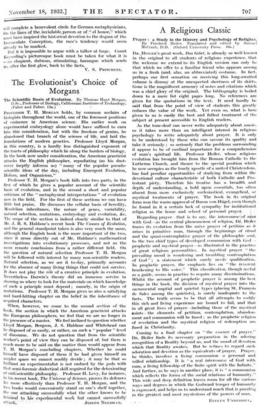A Religious Classic
Prayer : a Study in the History and Psychology of Religion. By Friedrich Heiler. Translated and edited by Samuel McComb, D.D. (Oxford University Press. 168.)
DR..HEILER'S great work, Das Gebel, is already so well known in the original to all students of religious experience, that
the welcome we extend to its English version can only be that which we offer to a familiar friend who appears among us in a fresh (and, alas, an abbreviated) costume. In fact, perhaps our first sensation on receiving this long-awaited volume is dismay at the unexpected shortness of its skirts.
Gone is the magnificent armour), of notes and citations which
was a chief glory of the original. The bibliography is boiled down to a mere list eight pages long. No references are given for the quotations in the text. It need hardly be said that from the point of view of students this greatly reduces the value of the work. Yet even so, what is here given to us is easily the best and fullest treatment of the subject at present accessible to English readers.
As the tone-deaf can never write adequately about music, so it takes more than an intelligent interest in religious psychology to write adequately about prayer. It is only to be understood by those who can savour its quality and take it seriously ; so seriously that the problems surrounding it appear to be of cardinal importance for a comprehension of man's spiritual life. Professor Heiler, whose religious evolution has brought him from the Roman Catholic to the Lutheran Church, and thence to the special position which he now occupies as the lonely apostle of a united Christendom, has had peculiar opportunities of studying front within the devotional culture characteristic of both Catholic and l'ro- testant piety. Therefore his treatise has a breadth and depth of understanding, a hold upon essentials, too often absent from more exclusively ecclesiastical, evangelical, or mystical treatments of prayer. The book in its 'original form won the warm approval of Baron von Hugel, even though he found in it a certain lack of sympathy for institutional religion as the home and school of personal prayer.
Regarding prayer—that is to say, the intercourselof
with God—as the cc. ntral phenomenon of religion, DO. Heiler traces its evolution from the naive prayer of petitian as it
arises in primitive man, through the beginnings of ritual and the quasi-contemplative prayer of the philosophic soul, to the two chief types of developed communion with God -- prophetic and mystical prayer—as illustrated in the practice of great religious personalities. In mystical prayer "the prevailing mood is wondering and trembling contemplation of God" ; a statement which surely needs qualification. In prophetic prayer, the emphasis lies on "the reverent hearkening to His voice." This classification, though useful as a guide, seems in practice to require Many discriniinations.
Whilst the account of prophetic prayer is among the best things in the book, the division of mystical prayer into the sacramental nuptial and quietist types (placing St. Francois de Sales among the quietists), is surely inadequate to the facts. The truth seems to be that all attempts to codify this rich and living experience are bound to fail, and that in all great lives of prayer—including those of the mystical
saints--the elements of petition, contemplation, abandon- ment and communion will be fused ; as the prophetic religion of revelation and the mystical religion of redemption arc fused in. Christianity.
Coming to a final chapter on "the essence of prayer," Dr. Heiler finds its necessary preparation in the adoring recognition of a Reality beyond us, and the mood of devot' which that Reality awakes. But he refuses to regard such adoration and devotion as the equivalents of jirayer. Prayer, he thinks, involves a living communion— a personal and willed relationship. It is "a real intercourse of God with man, a living fellowship of the finite spirit with the Infinite." And further, as he says in another place, it is "a communion which reflects the forms of the social relations of humanity." This wide and deep definition leaves room for all the various ways and degrees in which the Godward temper of humanity is expressed, and helps us to understand much that is puzzling in the greatest and most mysterious of the powers of man.
EvErins Umanattit.t.
































































 Previous page
Previous page